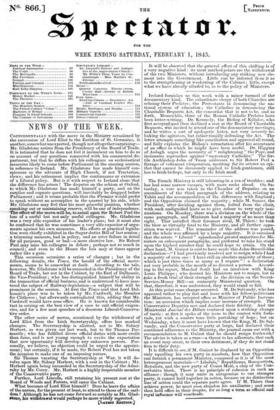Ireland furnishes us this week with a minor turmoil of
the documentary kind. The subordinate clergy of both Churches are echoing their Prelates ; the Protestants in denouncing the na- tional system of education ; the Catholics in denouncing the Charitable Bequests Act, the concordat that is not to be, and so forth. Meanwhile, three of the Roman Catholic Prelates have been letter-writing. Dr. Kennedy, the Bishop of Killaloe, who first acceptfcpancl then declined a seat at the Board of Charitable Bequests, Nig invited to attend one of the denunciatory meetings; and he writes a sort of apologetic letter, not very severely re- buking the agitatois, but rather timidly defending the Act. The letter attempts something like conciliation and approval all round, and fully explains the Bishop's retractation after his acceptance of an office in which he might have been useful. Dr. Higgins of Ardagh urges the necessity of " enlightening " the Pope, and insinuates reproaches against "mercenary Catholics." The fer- tile Archbishop John of Tuam addresses to Sir Robert Peel a farrago of vehement vituperation, meriting for its utterer an epi- thet that cannot be decorously applied to Irish gentlemen, still less to Irish bishops, but only to the Irish snuff.


























